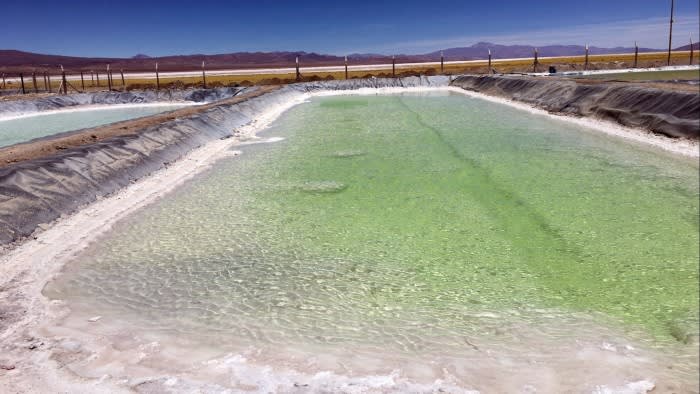Unlock the Editor’s Digest for free
Roula Khalaf, Editor of the FT, selects her favourite stories in this weekly newsletter.
Buying close to the bottom of the market should mean bagging a bargain. Rio Tinto is buying Arcadium Lithium at a time when slowing demand for electric vehicles is savaging the price of lithium used in batteries. The lithium carbonate price has dropped more than 80 per cent since its peak. Yet for all of Rio chief executive Jakob Stausholm’s talk of countercyclical moves, the $6.7bn price tag for Arcadium isn’t a steal.
Rio knows all too well the dangers of buying at the top of a market. Memories of its disastrous $38bn takeover of Canadian aluminium group Alcan in 2007 — right at the top of the aluminium market — still loom large. Arcadium is its biggest acquisition since. This time, Rio is betting that a painful lithium supply glut will reverse towards the end of the decade.
Rio already has one lithium scheme that is close to production: Rincon in Argentina. Another proposed project in Serbia has been hit by protests. Arcadium would contribute immediate annual production of about 75,000 tonnes of lithium carbonate equivalent — its current production is in Argentina and Australia — but it has expansion plans to double capacity by the end of 2028.
Rio argues that even when the market is in oversupply, Arcadium’s lower-cost production should protect it. In the second quarter, it had an adjusted ebitda margin of 39 per cent despite the dire market conditions.
But even if you set aside the fact that not all miners share this bullish view on lithium, Rio is paying a full price for Arcadium.
The offer price of $5.85 per share is more than double Arcadium’s three-month average share price before talks were confirmed on Monday. Granted, Arcadium’s share price has dropped almost 40 per cent this year. But using 2024 earnings estimates from Visible Alpha, the enterprise value/ebitda multiple also looks rich at about 18 times. US-listed Albemarle, the world’s largest producer, trades on just under 15 times.
True, Rio would have struggled to lowball Arcadium. The deal requires approval of 75 per cent of the latter’s shareholders. One Arcadium investor has already said it will vote against the deal and is looking for closer to $8bn.
But the extreme volatility in lithium prices in recent years reflects uncertainty about how the global EV market will play out. Several global carmakers have scaled back their EV plans.
Seventeen years on from Alcan, Rio might not be buying at the top of the market. But its most important roll of the M&A dice since then looks like a risky one.
nathalie.thomas@ft.com
https://www.ft.com/content/3c1fefb4-ee5d-4ed7-8734-345846db047d


